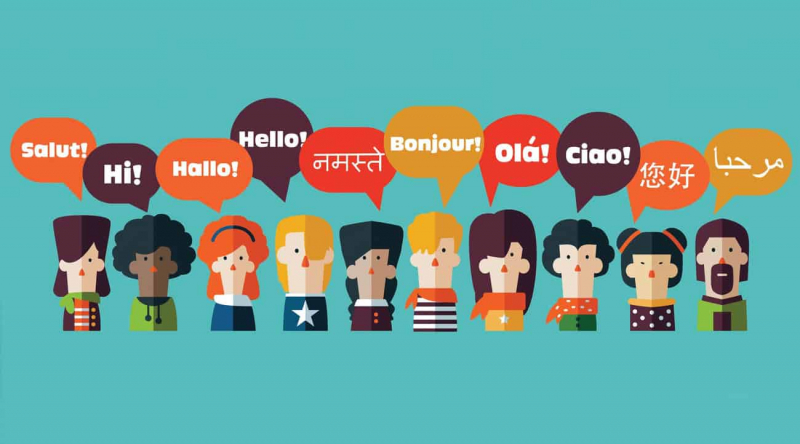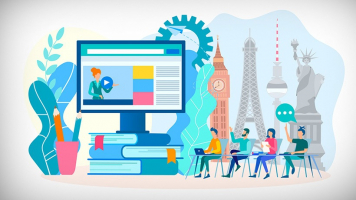Top 10 Advantages of Learning a Foreign Language
Knowing a second language in the 21st century is not only beneficial but also required for success in life. As the global economy continues to globalize, ... read more...different communities and cultures are coming into increasingly frequent contact with one another. Learning another language also provides many other benefits including greater academic achievement, greater cognitive development, and more positive attitudes towards other languages and cultures. Read on to find out the reasons why you should learn a foreign language!
-
When it comes time for you to advance in your job, speaking more than one language will make you an attractive candidate. More companies than ever are doing business abroad and working with clients from other countries in an increasingly globalized business environment.
In fact, according to data from Salary.com, multilingual people often make 5% to 20% more than monolingual people. If you're uncertain which language would help your career the most, it's worthwhile to think about the industries you'd like to work in and the locations you'd like to work in. Mandarin Chinese is now the most frequently used language in the world, with 1.2 billion people speaking it in some form. And since China is frequently the center of innovation, learning Chinese might be a profitable alternative for people in the IT sector. Similar to English, Spanish has more than 477 million native speakers and more than 550 million total speakers, making it a popular language among organizations like the United Nations.

It can boost your career prospects 
It can boost your career prospects -
Use it or lose it. How many times have you heard that phrase? It is a well-known truth that brain functions improve with more use. Your memory will get a good workout in the brain gym when you learn a new language.
You must commit a wide collection of brand-new vocabulary and grammatical rules to memory if you wish to become fluent in another language. You could discover that your memory improves in other aspects of your life once you've trained it to learn a new language. Researchers in Sweden who were investigating the relationship between language proficiency and memory found that students who had participated in a 10-month language course showed a 28% increase in memory when it came to recalling the names of people they had recently met.

Improved memory 
Improved memory -
"Do they speak the language over there?" is one of the first questions people ask when making travel plans abroad. In case of an emergency while traveling overseas, knowing how to communicate with locals might be really helpful.
Traveling will be a lot easier if you learn the basics of the local dialect, which will also make the trip more enjoyable and memorable. You reduce your chances of getting lost in a strange place by using it to read signs and ask for directions, both of which are quite helpful. Additionally, being able to communicate in the local dialect allows you to comfortably place an order at a restaurant, check into a hotel, and even better, negotiate for a cheaper price in the market! Being bilingual gives you the benefit of being able to see the world from several perspectives, which improves your ability to communicate in today's globally connected world.

Traveling becomes a lot easier 
Traveling becomes a lot easier -
It's commonly known in the field of psychology that learning new skills, like a foreign language, is good for your psychological wellbeing. This is because people are becoming more and more aware of the value of mental health on a worldwide scale.
According to research, learning new skills may also enhance your mental health by boosting self-confidence and raising self-esteem; helping you to build a sense of purpose and helping you to connect with others. When you learn a new skill, your level of self-assurance increases, and you enjoy a feeling of accomplishment whenever you succeed in a task. Having a class to go to or homework to complete each week might prove to be a useful distraction or give your day more meaning if you're struggling with challenging circumstances in your life.

Learning new skills improves mental health 
Learning new skills improves mental health -
Speaking more than one language opens you new opportunities for travel and is a great chance to connect with people you would have otherwise never encountered in your day-to-day life.
Understanding a second language might help you communicate with people from various backgrounds on social media and other online channels in today's increasingly digital age. Speaking a second language might perhaps help to break out of social media bubbles, where you only communicate with others from similar cultural backgrounds. One thing is for certain: if you take the time and effort to learn about a new person's culture and language, you will greatly increase your chances of developing a meaningful relationship with them.

It introduces you to new people 
It introduces you to new people -
Learning a second language introduces you to a wealth of new vocabulary and pushes you to try out new ways of thinking. Therefore, it is not surprising that multilingual people also have greater levels of creativity.
It makes sense because learning and using a language other than your mother tongue allows you to access parts of the brain that aren't used when you speak only your native tongue. In fact, according to a study published in the National Academies of Sciences, this phenomenon is likely to be more pronounced in children who learn a new language from a young age. Their language training will better equip them to understand and navigate new ideas and concepts.

Being multilingual improves creativity 
Being multilingual improves creativity -
Dr. Thomas Bak, said: "Bilingualism can be seen as a successful brain training, contributing to cognitive reserve, which can help delay dementia". According to research, being bilingual can improve your brainpower later in life in addition to improving your memory and mental skills now.
Researchers who studied the relationship between multilingualism and brain health discovered that those who speak more than one language had a 4.5-year delay in the onset of dementia symptoms. It's important to note that this research concentrated on topics across all educational levels and in multiple occupations. The number of neural connections in the brain may expand as a result of learning a new language, which is one explanation for this.

You could keep your brain healthier for longer 
You could keep your brain healthier for longer -
Learning a new language is difficult unless you are a true prodigy. But there is good news as research from the University of Haifa discovered that those who are already bilingual have the ability to learn a new language.
Gaining a better aptitude for language learning is a skill developed when bilinguals learned how to speak a second language. Just as riding a bike for the very first time was extremely difficult for us, the next attempt was a lot easier. Many languages reinforce one another, which can serve as a basis for future learning. One researcher 2011 looked into the potential advantages of bilingualism for those learning a third language. They discovered that students who are competent in two languages had an easier time mastering a third language than those who are just proficient in one.

It’s easier to learn a third language 
It’s easier to learn a third language -
Although studying a foreign language is likely your main objective in order to gain new skills, being bilingual may also allow you to improve your spoken and written English skills.
Learning a foreign language's syntax, verb tenses, and verb forms may also make you think about these characteristics of your own language, which might help you become more proficient at grammar. Consider this: Do you truly comprehend the underlying grammatical rules of your mother tongue, or do you simply intuitively feel that way because you grew up with native speakers? Learning a new language also makes you a better listener as you are used to having to interpret meaning and judge nuances.

Being bilingual can improve your English 
Being bilingual can improve your English -
Learning a second language has been found to significantly improve student performance throughout the curriculum in addition to meeting the needs of future students. It has been demonstrated that learning a language enhances a student's cognitive abilities.
Studies reveal that the advantages of learning a new language include greater scores on standardized exams in math, reading comprehension, and vocabulary for multilingual students compared to the results of monolingual students. This is due to improved cognitive skills. Although kids might wonder why they need to learn this language, parents and teachers know better. Language proficiency increases your ability to perform well in problem-solving tasks across the board, a fact recognized by the compulsory foreign language learning curriculum in schools.

Improves performance in other academic areas 
Improves performance in other academic areas































